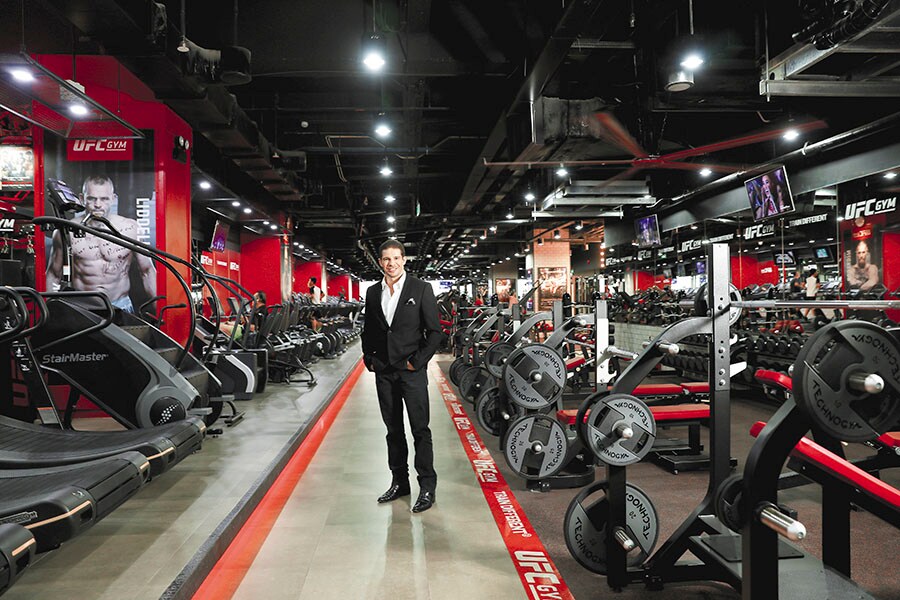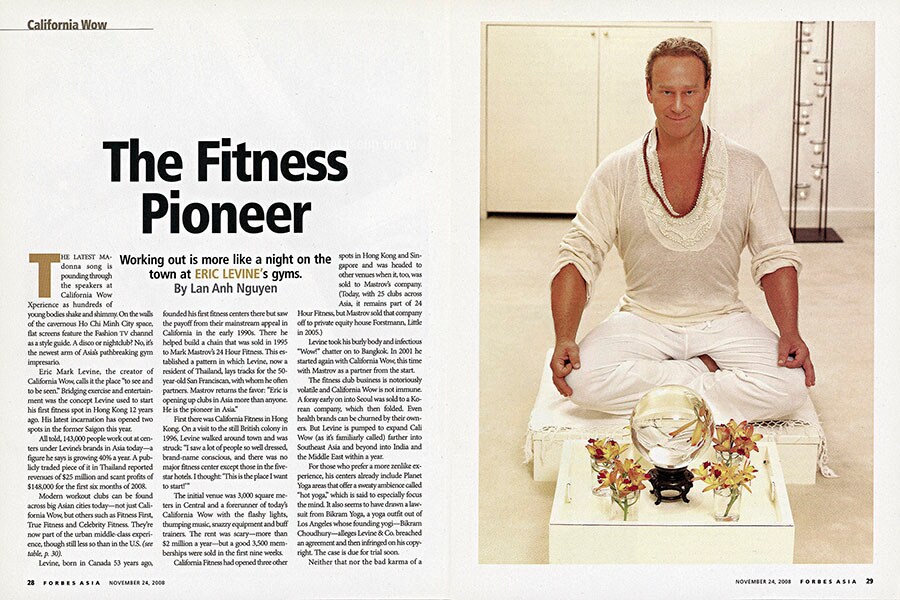
Randy Dobson: A fitness pioneer who's building a life enhancement ecosystem in Vietnam
A fitness vet in Vietnam is selling more: A healthy-lifestyle 'ecosystem'

Randy Dobson: “The middle class in Vietnam is growing faster than I can build clubs.”
Randy Dobson looks younger than his 41 years and is in the kind of shape you’d associate with his livelihood. The American arrived in Vietnam less than ten years ago to launch a modern gym in the heart of Ho Chi Minh City (HCMC). Now he owns a network of companies whose services and products surround what he calls a “Life Enhancement Ecosystem”. He quips: “Remember, you heard that term from me first!”
CMG.Asia is the holding company he chairs. It owns nearly a dozen brands in fitness, health care and beauty, retail sports and health care products and media, all based in Vietnam. In 2016, CMG.Asia, a joint-stock (but not yet listed) company, reported revenues of $75 million, way up from $48 million in 2015. Dobson looks for sales to reach $110 million this year. “It’s just the beginning,” he says, sitting in a posh yoga centre in a fast-changing district of HCMC, where CMG.Asia has just launched a new UFC Gym, the first mixed martial arts workout in Vietnam. It’s an American franchise owned by Mark Mastrov’s New Evolutions Ventures.
UFC joins CMG’s 30 California Fitness & Yoga Centres, with 150,000 members in Vietnam, most of those on long-term contracts. In 2016, a new fitness brand for children, called Cali Kid, was launched. UFC Gym is for those who want a more intense workout. There are five Eri International Clinics, Japanese-inspired beauty centres using anti-ageing technologies. Almost every fitness location boasts a sport-related retail outlet. And the “ecosystem” is promoted by seven different media outlets from publishing to movie production, including a talent company and advertising, all devoted to what CMG calls a “making-life-better system”.
In his latest alignment with Mastrov, the Californian who founded 24 Hour Fitness, Dobson is circling back to his roots. In his early 20s, he began working for Mastrov’s iconic outfit in Seattle, where he’s from, and then was sent to Hong Kong to build the business in the region. “He was one of the best people in Asia,” Mastrov says. In 2005, the founder sold 24 Hour Fitness, and in the ensuing years, Dobson convinced him to partner on a gym business in Vietnam. Mastrov brought in Eric Mark Levine, another US entrepreneur, who was running a successful fitness chain in Thailand. Eighteen months into the partnership, Dobson did a structured buyout of the two other men’s stakes and became sole owner of California Fitness, today CMG.Asia.

Mastrov has kept his hand in the field, with ventures like UFC Gym, but says he admires Dobson’s “brilliant idea” to wrap other lifestyle businesses around the workout culture. He tells Forbes Asia, “Nobody put it all together like Randy had. He travels the world, learns from different markets and packed it in one company.”
Timing wasn’t great for Dobson in the first three years—he came as the Vietnamese economy was peaking and paid high rent, then the 2008 financial crisis hit town a few years later. But CMG.Asia persisted, opening new centres in the market slump. It got a kick in 2013, when Japanese bank Mizuho’s investment fund bought 10 percent of the California Fitness brand, valuing it at $150 million. Since then, Dobson has quickened the realisation of his lifestyle concept.
He recalls an early conversation with Dan Fort, who’s worked with him for 19 years and is now the CEO of CMG.Asia: “The industry is not gonna look like what it looks today, but I believe we are moving into a golden era of health and wellness because as people become more full [well fed], they’re gonna care more about their health and longevity. And if we could be in the right position—because nobody else understands the industry better than us—we’re right here on the ground floor.”
The company has a staff of 3,600, more than 1,000 of them personal trainers, 95 percent Vietnamese. Members are cheered on as they enter—and on average they come ten times a month versus three in the industry overall. Two million followers get the word out on Facebook and Instagram. Rivals exist, but first they must get through CEO Fort, himself a bodybuilder: “California [the company] is in my DNA,” he says.
“Put me in front of any competitor, I can beat them. I can’t let anyone take away our market, because this is all I know.”
Dobson has broader Asian ambitions, such as with the Hellobasci medical info platform he’s bringing online in Indonesia and Myanmar, and with more Eri International clinics.
But he plans to always have Vietnam as a base. “I think the middle class in Vietnam is growing faster than I can build clubs, and I think it will continue. One of the things I found interesting ten years ago about Vietnam is that it has a very stable government, one of the most stable in the region. The country’s got a very young population—much younger than Thailand or any other country in the region—a single language, a single landmass. There’s more of a unity in this market, and it’s an easier market to be influenced. Over the next decade, the majority of Vietnamese people will be in a position when they can afford at least half of what we are offering.”
(Adapted from Forbes Vietnam, a licensee of Forbes Media.)




